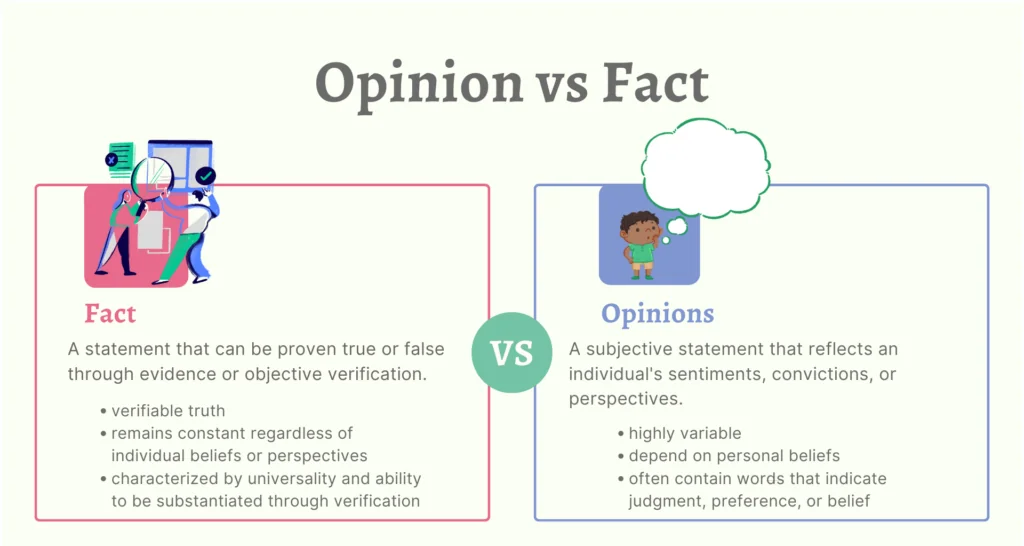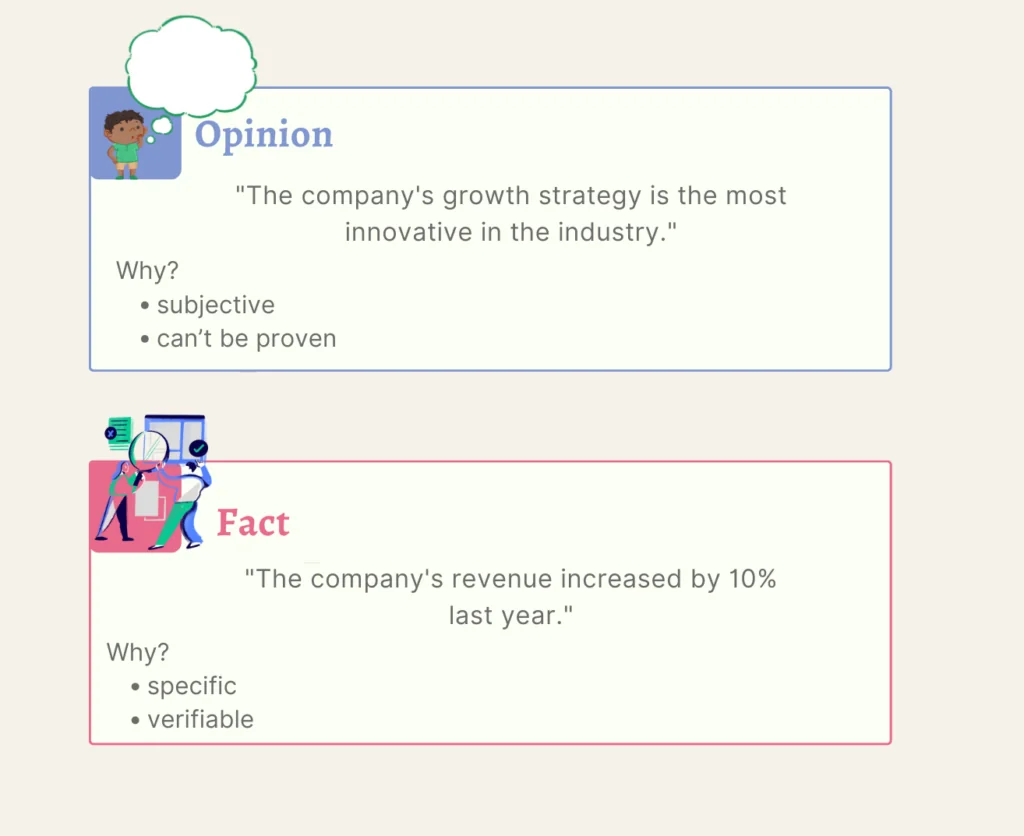In an era dominated by information overload, distinguishing between fact and opinion is more necessary than ever. Whether you’re a college student doing academic research or a social media user scrolling through your feed, understanding the difference can shape your worldview and influence your decision-making. The major thing you have to understand is that the difference between opinion vs fact lies in the following: a fact can be proven true or false, while an opinion is based on personal beliefs and cannot be proven. Further below, we will guide you through the nuances of facts and opinions.

✅ AI Essay Writer ✅ AI Detector ✅ Plagchecker ✅ Paraphraser
✅ Summarizer ✅ Citation Generator
Definition: Fact vs Opinion
A fact is a statement that can be proven true or false through evidence or objective verification. It is a verifiable truth that remains constant regardless of individual beliefs or perspectives. Facts are characterized by their universality and their ability to be substantiated through verification. They are independent of personal feelings or biases and are based on empirical evidence or logical deduction. For example, “The Earth revolves around the Sun” is a fact because it is supported by scientific evidence, can be objectively verified, and is universally accepted as true.

An opinion, on the other hand, is a subjective statement that reflects an individual’s sentiments, convictions, or perspectives. Opinions are characterized by their variability and their dependence on personal beliefs. They cannot be universally proven true or false and often contain words that indicate judgment, preference, or belief. For example, “Vanilla is the best ice cream flavor” is an opinion, as it is a personal preference, varies from person to person, and cannot be objectively verified as true or false.
Identifying Facts and Opinions in Various Contexts
In various social and professional contexts, distinguishing between facts and opinions is essential for effective communication and decision-making. This distinction helps individuals navigate through a plethora of information, ensuring that they can critically analyze and interpret messages accurately.
Media
In news media, facts are presented as objective reporting, providing verifiable information without personal bias.
Example:
A news report states, “The unemployment rate dropped to 5% in the last quarter.”
What is this statement?
A fact that can be verified with economic data.
On the other hand, opinions are often found in editorials or opinion columns, where writers express their viewpoints or interpretations of events.
Example:
An opinion piece might argue, “The government’s economic policies have been highly effective in reducing unemployment.”
What is this statement?
A subjective assessment that cannot be universally proven.
Literature
Here, facts might be historical events or settings that provide a backdrop for the story. For example, a novel set during World War II might include factual information about the war’s timeline and major events. In contrast, opinions are expressed through characters’ thoughts and feelings, which are subjective and open to interpretation. For instance, a character in the novel might believe that “War is a necessary evil for protecting one’s country,” which is an opinion reflecting the character’s personal belief.
Language as a Key to Understanding
To identify facts and opinions, pay attention to the language used. Statements with words like “always,” “never,” or specific numbers are likely to be facts, as they provide definitive information.
Example:
“The company’s revenue increased by 15% last year”
What is this statement?
A factual statement that can be verified with financial records.
Conversely, phrases such as “I think,” “in my opinion,” or “best” indicate opinions, as they reflect personal judgment or preference.
Example:
“I think this is the best strategy for the company’s growth”
What is this statement?
An opinion, based on the speaker’s personal viewpoint and cannot be objectively verified.
Strategies for Distinguishing Facts from Opinions
You need to develop the skill of distinguishing between facts and opinions. This ability improves critical thinking and helps build one’s judgments and decisions on solid ground. Here are some strategies to help you effectively differentiate between the two:
- Verify the Information: Before accepting a statement as a fact, check it against reliable sources to determine if it is a verifiable truth. For example, if someone claims, “The Amazon Rainforest produces 20% of the world’s oxygen,” you can research scientific studies or authoritative websites to verify this information. If the statement is supported by credible evidence, it can be considered a fact.
- Analyze the Language: Pay close attention to the language used in the statement. Subjective language or personal pronouns often indicate an opinion. For instance, a statement like “I believe that renewable energy is the key to a sustainable future” is an opinion because it is based on personal belief and uses the pronoun “I.” In contrast, a statement like “Renewable energy sources generated 29% of global electricity in 2020” is a fact because it provides specific, verifiable data without subjective language.
- Consider the Source: The credibility of the source is important in determining the reliability of the information. Evaluate whether the source is known for factual reporting or if it has a reputation for presenting opinionated content. For example, a peer-reviewed scientific journal is more likely to present factual information, while a political blog may be more inclined to share opinions.
- Seek Objectivity: Look for statements that can be independently verified, regardless of personal beliefs or biases. A fact should remain true regardless of individual perspectives. For example, “Water boils at 100°C at sea level” is an objective fact because it can be tested and verified through experimentation, irrespective of one’s beliefs or opinions.
By applying these strategies, you can navigate through the vast ocean of information with a discerning eye, distinguishing between facts that shape reality and opinions that reflect personal perspectives.
Evaluating Evidence and Discerning Subjectivity
Evaluating evidence and discerning subjectivity are essential skills for navigating the complex landscape of information we encounter daily. Evaluating evidence involves a thorough examination of the:
- quality
- reliability
- source of the information supporting a statement.
This process plays a vital role in determining whether a statement is a fact, which can be verified and is universally true, or an opinion, which is subjective and based on personal beliefs.
To evaluate evidence properly, one should consider the source of the information, the methodology used to obtain it, and the presence of any potential biases. For instance, evidence from a peer-reviewed scientific journal is generally more reliable than an unsubstantiated claim on a social media platform. Additionally, understanding the context in which the evidence was gathered and the consensus among experts can provide further insight into its validity.
Discerning subjectivity is equally important. This involves recognizing when a statement is influenced by personal beliefs, emotions, or biases. Subjective statements often contain value judgments, assumptions, or generalizations that cannot be universally verified. To discern subjectivity, look for indicators such as emotive language, the use of personal pronouns like “I” or “we,” or phrases that express preference or opinion, such as “I believe” or “in my opinion.”
Example:
Consider the statement: “The government’s response to the pandemic was inadequate.”
To evaluate this, you would first examine the evidence supporting this claim. This might include:
- data on infection rates,
- economic impact,
- healthcare system capacity,
- and comparisons with other countries’ responses.
You would also consider the source of this information and any potential biases.
Next, you would discern the subjectivity in the statement. The use of the word “inadequate” is a value judgment that reflects the speaker’s opinion. It is subjective because what is considered “adequate” can vary from person to person based on their expectations, experiences, and beliefs.
By evaluating the evidence and discerning subjectivity, you can determine that while there may be factual elements in the statement (e.g., data on infection rates), the overall assertion is an opinion influenced by personal beliefs and perspectives. This distinction will help you form well-rounded views and engage in informed discussions.
Real-Life Examples of Fact and Opinion
In real life, distinguishing between fact and opinion is highly important in various scenarios:
Academic Research
When doing academic research, it is essential to differentiate between facts and opinions to present well-researched arguments. For example, a fact in a research paper might be, “The global average sea level has risen by about 8 inches since 1880,” which is a measurable and verifiable statement. An opinion, on the other hand, might be, “We should invest more in renewable energy to combat climate change,” which is a subjective statement based on personal beliefs or values.
Job Interviews
During job interviews, candidates should base their responses on facts while expressing opinions that align with the company’s values.

For instance, a fact could be, “The company’s revenue increased by 10% last year,” which is a specific and verifiable piece of information. An opinion might be, “The company’s growth strategy is the most innovative in the industry,” which is a subjective judgment that cannot be universally proven.
Healthcare Decisions
With healthcare, distinguishing between factual medical information and personal beliefs is necessary for informed decisions. A fact could be, “Vaccines have been proven to prevent certain diseases,” which is supported by scientific evidence. An opinion could be, “Natural remedies are always better than vaccines,” which is a personal belief that varies from person to person.
Political Debates
Any politician or person involved in this sphere needs to be able to recognize statistical data over political opinions. For example, a fact might be, “The unemployment rate decreased to 5% last quarter,” which is a specific and measurable statement. An opinion could be, “The government’s economic policies are the best for job creation,” which is a subjective assessment of the government’s performance.
Consumer Reviews
When writing a review you need to be able to state objective product features and separately mention subjective user experiences. A fact could be, “The smartphone has a 6.5-inch display,” which is a specific and measurable feature. An opinion might be, “The smartphone’s design is the most elegant on the market,” which is a subjective judgment based on personal taste.
Environmental Discussions
For those of you who love to discuss global warming, knowing what is scientific data and what are personal viewpoints is essential. A fact could be, “Carbon dioxide levels in the atmosphere have reached their highest in 650,000 years,” which is a statement supported by scientific research. An opinion might be, “We need to drastically reduce our carbon footprint to save the planet,” which is a subjective statement based on personal values and beliefs.
Conclusion
Knowing what are opinions, and which pieces of information are facts is a key to functioning in a media-driven society (which we basically are). With the help of effective evaluation strategies, recognizing subjectivity, and analyzing language, you can discern verifiable truths from personal beliefs. This distinction can help empower you to engage in productive discussions, make informed decisions, and contribute to a more informed and rational society.
FAQ
Follow us on Reddit for more insights and updates.





Comments (0)
Welcome to A*Help comments!
We’re all about debate and discussion at A*Help.
We value the diverse opinions of users, so you may find points of view that you don’t agree with. And that’s cool. However, there are certain things we’re not OK with: attempts to manipulate our data in any way, for example, or the posting of discriminative, offensive, hateful, or disparaging material.